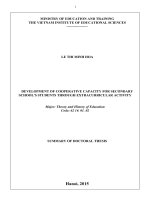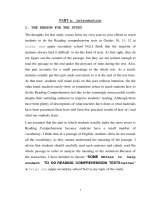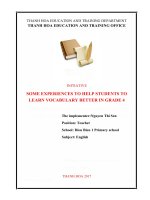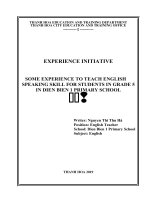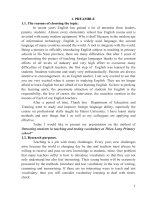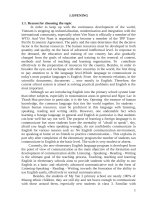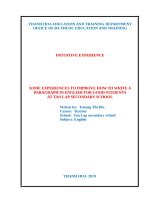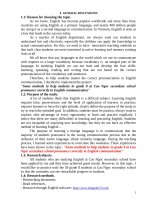Some experiences to help lower secondary school students study vocabualary effectively
Bạn đang xem bản rút gọn của tài liệu. Xem và tải ngay bản đầy đủ của tài liệu tại đây (109.47 KB, 17 trang )
THANH HOA DEPARTERMENT OF EDUCATION &TRANNING
THANH HOA EDUCATION AND TRAINING
INITIATIVE EXPERIENCE
SOME EXPERIENCES TO HELP LOWER SECONDARY SCHOOl
STUDENTS STUDY VOCABULARY EFFECTIVELY
Full name: TA THI NGA
Job: Teacher
Work unit: Nguyen Van Troi secondary school
Subject: English
1
TABLE OF CONTENTS
order
1
1.1
1.2
1.3
1.4
2
2.1
2.2
2.3
CONTENTS
Page
Introduction
The reasons to choose the subject
The aims of research
Object of study
Methods of research
Contents
Theoretical basis
Actual situation
Solutions
3
3
4
5
5
6
6
7
8
2.4
The effects of research
15
3
Conclusion and Offer
REFERENCE MATERIALS
16
SUBJECT: SOME EXPERIENCES TO HELP LOWER SECONDARY
SCHOOL STUDENTS STUDY VOCABULARY EFFECTIVELY
1. INTRODUCTION
2
1.1 The reasons to choose the subject.
Nowadays, the Ministry of Education and Training implemented the project
"Teaching and learning foreign languages in the national education system", in the
period 2008 - 2020, the teaching and learning foreign languages in general.
Especially, English are very urgent. As a teacher of English , training future people
can understand the foreign information that can apply to make our country richer
and stronger.
English is considered as a means of communication, Therefore, It's necessary for us
to study vocabulary as much as possible.
In any foreign language, the role of the vocabulary is very important. We
can't understand the language without understanding vocabulary, or through
vocabulary units. But that does not mean that you only understand individual
lexical units that are independent of each other but we can only master the language
through dialectical relationships between vocabulary units. Thus, learning
vocabulary and practicing vocabulary skills is a leading factor in the transmission
and acquisition of a language in general and English in particular.
Since vocabulary is a unit of language, it is expressed in two forms: speech and
writing. To use that language, that is to grasp the expression form of words by
words and words. But because of the relevance of the vocabulary to other elements
in the language (grammar, phonetics, intonation, etc.) or in the context of specific
communication, we find the vocabulary be "bricks". Grammar and other linguistic
elements are considered as "mortar vessels" to build into a language house.
In lower secondary schools teachers teach students along with other subjects on
the basis of equipping the students with the necessary skills and techniques to train
the knowledgeable, skilled, dynamic and creative ... to form and train the skills for
students requires that teachers do not only pay attention to the transfer of
knowledge in textbooks, Instructional means that pay attention to the organization
of the teaching process in the direction of activating the learner's activities,
3
promoting the active role of students in learning and organization, but most
students do not understand the importance of vocabulary so they are lazy to learn
vocabulary or use it. On the other hand, the new knowledge of the language is so
far away from the mother tongue that students feel afraid to learn. So what does the
teacher have to do is to make the vocabulary no longer a "problem" for the
students, this makes me think alot, with many years of experience in lower
secondary school, facing to a lot of students who have no Vocabulary, spelling
mistakes, and misunderstandings that motivates me to implement the topic "how to
help secondary school students use and remember vocabulary effectively.".
1.2 The aim of research
Nowadays, in lower secondary schools, like other subjects, English is being
taught and studied popularly. However, to use it, it requires us to have vocabulary.
Because vocabulary is an indispensable ingredient in language, it is used for
communication. Therefore, it is very important to know the vocabulary.
In English we can not train and develop students' four listening, speaking,
reading, and writing skills without relying on vocabulary. Indeed, without
vocabulary, the children can neither hear nor speak, read or write, even if they
know the structures of the sentence.
In the past, learning and teaching the lessons were traditional: Teacher reads and
lists words. Then the teacher explains the meaning, the use of the word, the type of
the student. It has the following fundamental limitations: Making students passive
in their vocabulary enrichment, using words in the context of limited, inflexible and
often arbitrary contexts of grammatical structure. The problem here is to study the
application of vocabulary skills, namely the introduction skills and the vocabulary
test for students to be appropriate and effective.
1. 3 Object of study:
Students in grades 6,8 of Nguyen Van Troi lower secondary school.
1. 4 Methods of research
4
By active teaching methods, students are the centers of learning. Students must
listen to the teacher, then grasp the new knowledge as well as re-train the old
knowledge, the ultimate goal is the practice of communication. Students who
present in front of the class will find out if they have learned the lesson and are able
to use it, instead of using one-way communication, we can use teacher - students,
students -students, students - teachers. Through this means of communication the
teacher will find out and adjust his method. Only by practicing, can students use
and remember vocabulary correctly and effectively like the western proverb says:
When you hear, you will forget
When you hear and see, you will remember a little
When you listen, look and practice, you will understand the knowledge and
skills.
During the study, I used the following methods
-
Methodology of theoretical research: Based on the guidelines for renovating the
Secondary Education method of English by the Department of Higher Education Ministry of Education and Training issued in July 2007.
- Research methods include the following methods: Observation, investigation,
analysis, exchange, statistics, synthesis, comparison, summation of experience.
2. CONTENTS
2.1 Theoretical basis.
During the teaching process: the knowledge is most important, but we should
pay attention to the methods of teaching as well. That helps students get knowledge
easier, more interested in studying. When teaching a language, especially English
language, the teacher needs to do the interviews with the students who come in
contact, which is the most accurate and the most complex. The first step that is to
establish a language is to base on vocabulary and structures.
5
- To help students remember vocabulary and use structures is very
important. To do this well, the teacher needs to be creative, uses the new methods
in the lessons effectively. And it is suitable for students of the class.
- Through training, workshops and professional training. Every teacher is
taught and absorbed in the appropriate teaching methods for each lesson, the type
of lecture. Besides, each teacher also needs to learn more about the teaching
methods of colleagues by attending to class, discuss ways to learn from experience
and how to teach creatively
- The new textbook has many advantages but also requires students to
actively learn and acquire knowledge and lessons that are highly communicative.
That requires them to use better listening and speaking skills. To help pupils,
especially those who are shy, afraid to communicate with the opportunity and
interest in learning English, I have taught and practiced vocabulary and structures
through some games.
In this topic, I show how to play some games that apply to vocabulary and
structure practice in teaching English in grades 6 and 9 for effective teaching and
learning.
2.2 Actual situation
As a teacher directly have taught English for many years, I've noticed the
majority of students are weak in English. That makes me think a lot and try to find
out the cause, which can solve the problems, increase the number of strong students
up and limit weaknesses of students in the department. Through practice I noticed
one of the reasons that the number of poor students is much longer due to family
circumstances were difficult, they also help their families economically after
school, their learning conditions are limited, they have no dictionaries, reference
books or video tape machines that help support skills of listening, speaking,
practice more. School has difficulties in facilities such as cassettes, pictures, .... But
cause they told most is that they feel no interested in the subject, that the subject is
6
difficult, they do not have the environment to communicate daily so quickly forget,
which led to slow acquisition, their learning ability is unequal. from this fact, to
cheer, encourage and stimulate the curiosity of students I believe that every teacher
should study and application of teaching techniques to match the lesson content,
contribute What directs students to the lesson content and the desire to learn
English. To start a lesson with enthusiasm, excitement, I want them to start learning
a foreign language more lively and equally excited when they join a game with
their teams so they are not bored to see their teacher who every time walk into the
class. Conversely children waiting periods with such exuberance going to be so fun
outdoors.
For the reasons stated above, to meet the needs of teaching, I would like to
boldly make teaching techniques that I have applied in the teaching process. I think
this is a technique taught very easily to apply because of the simple but very
efficient and is practically the same.
2.3 Solutions
Teaching vocabulary helps students, understand, memorize and use words
appropriately in their specific contexts. Students at lower secondary school lever
still learn chunks of English which combine vocabulary and grammatical patterns
in an unanalyzed way. Therefore, it is crucial to give students plenty of time to
practise, memorize, recycle and extend their vocabulary and grammar in
meaningful contexts. Regular recycling of vocabulary helps students meet the same
words embedded in different contexts and activities again and again. When
teaching vocabulary, it is important to help students recognize, practise and
memorize vocabulary. These can be done by using visual aids, by allowing students
to listen and repeat the words, by explain their meaning, using definitions, pictures,
and translation if necessary, and finally, getting students to practise, using the word
with a range of spoken or written activities which can be done individually or in
pairs.
7
To make students memorize vocabulary effectively, I often celebrate the games
for students to attend. It helps students not only practise attentively but also relax.
Here are the games and activities I usually use:
+ Bingo
+ Chain game
2.3.1 Slap the board :
+ Hangman
+ Jumbled words
After teaching vocabulary, teacher
+ Lucky number
writes the words on the board, ask two
+ Jumbled letters
+ Noughts and crosses
students go to the board, stand in the
+ Rub out and remember
same distance in front of the board. Ask
+ Guessing games
+ Matching
another student to say the word aloud for
+ Simon says
two people slap the words who point
+ Word square
+ Slap the board
more words or faster is the winner.
+ Networks
Example:
+ Survey
+ Brainstorming
In "Unit 1- A closer look 1" (Grade 6).To
+ Shark attact
help students memorize the words better,
+ Substitution drill.
I can write these words on the board for student to practise.
football
physics
school
lunch
history
vocabular
y
judo
lessons
home
work
exercise
2.3.2 Who's better:
Example 1:
After finishing unit 4 and 5 (grade 6). I can give a game that helps students to
check how they remember "adjectives"
8
Divide the class into two groups. if one person in group 1 says a "long adjective",
one person in the other group has to say a 'short adjective". The group that can't
give out any words or wrong words will lose.
Ex: I
expensive
II
exciting
short
.......
tall
2.3.3 Games "Networks / brainstorming" to help students brainstorm, think of
activities or factors that teachers provide
Example 1.
In Unit 7 - Getting started (grade 8). To help students remember vocabulary about
types of pollution. I divide the class into four groups. Ask them to brainstorm about
the types of pollution. Tell them that they will have five minutes to prepare on an
extra board, when the time is over they will have to show their preparation which
group has more correct words will win.
air pollution
water pollution
noise pollution
Types of pollution
visual pollution
Example 2:
In Unit 2 - Looking back (grade 6). To help students remember vocabulary
about rooms in houses and things in the house. I divide the class into four groups.
Ask them to brainstorm about the types of house, rooms in the house, things in the
9
rooms. Tell them that they will have five minutes to prepare on an extra board,
when the time is over they will have to show their preparation which group has
more correct words will win.
bed
TV
sofa
living room
pillow
bedroom
Rooms in the house
Dining room
chairs
kitchen
bathroom
sink
2.3.4 Car- racing :
With this game, the teacher can do on the table for those who have three
straight lines to create two parallel track and the track divided into equal
rectangular box, depending on the time allowed, many more guys can race
different.
For example:
Racer1 on
over
river
ten
take
Racer 2 to
never
rest
rat
no
First, Teacher gives two words ex: Racer 1write "on", Racer 2 write "to" then
if team 1 goes first they have to find the word that starts with the last letter of the
competitor's word .Opposite, team 2 have to find the word that starts with the last
letter of team 1's words. From example above, "never" into the next cell over from
her as the "on" have the last word is "N", similar to turn one away from the record
"over" for example (to-over), turn 2 go 'rest' (over- rest), turn 1 go "river" (never river) role, in turn ...... Players will form two Thickener chain, including the mix of
10
jointed-tail (on-never - river - rat - take .....), the race will end when the racers
could not find a record of more or false from. At the beginning, teachers can give
students from any use, then enhanced by the use of prescribed only verbs, nouns,
adjectives ... or unlimited time to think many other skilled racers said "forced car"
that is used as the hard tails: x, y, u .... or just use a tail to force opponents to
competitive. Teacher may be the referee, who count the point and divide the class
into two teams to play together
2.3.5 Using postcards
This game helps students to review vocabulary.
Example:
In Unit 8 - looking back (grade 6). Review the form of regular and irregular
verbs of the past simple tense. I prepare some postcards about regular and irregular
verbs of past simple tense, divide the class into two groups then ask them in turn to
take the cards which have infinitive and past form of the verbs that teacher says.
When time is over, which group take more correct pairs of words, they win.
Ex: go -> went
play -. played
see -> saw
sing -> sang
take -> took
swim -> swam
..................
After playing this game, Teacher can check the understanding about the use of
verbs by giving an exercise, ask students from two teams to use the correct form of
the verbs above to complete the sentences.
Ex: 1. I ................to the movie theater last weekend.
2. We usually ........badminton after school.
3. He ..............his friends on the street yesterday.
4. My father ........... me to the zoo when I was small.
5. Duong can ..............karate.
....................
11
2.3.6 Matching.
Example 1: In Unit 3 (grade 6). To help students remember some phrases
they've learnt, the teacher holds this game. Teacher gives two columns, column A
are verbs and column B are nouns or phrases, then ask students to match the verbs
in column A with suitable nouns in column B. Remember one verb can go with
more than one noun.
A
play
B
the piano
exercise
do
homework
lesson
have
judo
study
lunch
2.3.7 Review words:
Example 1:
In Unit 8: A closer look 1 (grade 8). Teacher divides the class into 4 groups. The
teacher gives the rules of the game group 1 give a word, the other groups have to
give out the other forms of that word ( ex: noun, a verb, an adjective ......) group
that give more forms of the words will win.
Ex: Group 1: history
Group 2: historic/ historical/ historian
..................
To help students use the word form correctly, I give an exercise and ask groups to
complete with the correct form of the words. The group which completes faster and
correct more will win.
Example 1:
1 The Golden Gate Bridge in San Francisco is an ........... of this famous city.
( ICONIC)
12
2. Big Ben is a major monument in London which ................. the United Kingdom.
( SYMBOL)
3. New Zealand is famous for the ............beauty of its mountains and forests.
( SCENERY)
Example 2:
In Unit 11: A closer look 1 (grade 8).
1. Everyday we hear about new……………. ( develop ) in science and
technology.
2. Einstein was one of the greatest ……………(science)
3.
The
USA
is
a
world
leader
in
in the world.
space …………(
explore
)
4. Advances in ……………………..( medicine) science will help people live
longer in the future.
5. There is a link between ( economy)…………… development and the
environment.
Example 3:
Unit 9 - A closer look 1 (English Pilot 6), we can warm up by playing puzzles from
the computer by finding things that begin with the letters that teachers make.
T: write: c
S: write: cheap
T: write: d
S: write: Dangerous
T: write: e
S: write: exciting
2.4: The effects of research.
The creating games for each of a lesson that I mentioned above, are actually
being used a lot and a lot of people know, but I love trying to combine pleasure and
13
their favorite entertainment content, the purpose of the lesson are coordination of
teaching methods learned in educational university to give children a school
playground.
After using those techniques and games in the lessons, I see the results of
student learning have improved a lot. They feel excited and often impatient at the
beginning of each class of curiosity today they will not know what game to play,
especially the first time when they saw me take pictures in military, teaching aids.
After each lesson there is often part of the game they are happy and would say
" Oh, teacher! Let's play again the next day, okay? "I promise if you prepare the
lessons well and learn all over again to me from the time they took the new" play
"again.
For the poor but energetic students I can give them control the game and give
them a preview of the answer, in order for all students in all ability can participate
easily and weak students can participate directly in the following games.
Through practical teaching process at the block layer, the application put the
game into the class I see games charismatic, compelling students to learn more,
giving excitement of learning in each student, students focused on the lesson more.
This helps for imparting knowledge of teachers more effectively than before. The
acquisition of all students improves a lot. At the beginning of the school year, many
students are afraid of this subject, they do not like school because it is difficult to
understand, difficult to acquire, so far the quality of education has increased quite
evenly. The majority of the children are most interested in learning English, They
are excited about the lessons, they can remember the words right in class, their
vocabulary improve a lot, the poor student can also use the words they've learnt to
make simple sentences. The good students can make more complex sentences.
Detail results:
(After the exams in the year- an ordinal class).
14
Excellent
No %
6A3
51 10
20
8A1
50 10
20
8A4
44
3
6
8A5
49 6
12
3. Conclusion and Offer.
Class
Total
Good
No %
15 29
11
22
9
20
8
16
Moderate
No %
20
40
24
48
17
39
25
52
Weak
No %
6
11
5
10
15
35
10
20
Poor
No
0
0
0
0
%
0
0
0
0
- Conclusion:
With the change of the content of textbooks along with the direction of the
education sector in the innovation of teaching methods in the educational
institutions in a positive direction of the operation of student learning, the
application of teaching methods associated with the development of science and
technology to provide maximum efficiency in imparting the knowledge to students
is very important. No method is the most effective measure, it is to motivate
students to actively participate in learning, research brainstorming lesson. They
created the situation, context, helping the students practice more meaningful,
interesting and helps students focus all fast absorbing, contributing to improving
the quality of student learning and performance teacher's teaching performance.
Thus, the use of games not only create a fun atmosphere, excitement in student
learning but also a scientific procedure, and creativity of teachers. Knowing how to
integrate topics suitable for your unit stimulates passionate learning, each student
studies. We need to look at the game as a rewarding job for those students
.However, the application of this language game will not avoid the noise and affect
other classes for psychology students who are very sensitive and hyperactive,
sometimes can not control them ... So teachers must be dynamic, flexible in solving
the real game effectively.
Above is a little experience myself accumulated through the process of teaching
and
learning
from
the
coworkers. The
presentation
certainly
inevitable
shortcomings, we respectfully request that the school headmaster and colleagues all
15
sincere comments so that I become more complete with this teaching experience .
I sincerely thank you !
Thanh Hóa, ngày 30 tháng 5 năm 2020
Xác nhận của thủ trưởng đơn vị
Tôi xin cam đoan đây là sáng kiến
kinh nghiệm của mình viết, không
sao chép của người khác.
Người viết SKKN
Tạ Thị Nga
REFERENCE MATERIALS
1. English teacher's books (grade 6 & 8).
2. Internet
3. Using techniques in teaching a foreign language.
16
DANH MỤC
CÁC ĐỀ TÀI SÁNG KIẾN KINH NGHIỆM ĐÃ ĐƯỢC HỘI ĐỒNG ĐÁNH
GIÁ XẾP LOẠI CẤP PHÒNG GD&ĐT, CẤP SỞ GD&ĐT VÀ CÁC CẤP
CAO HƠN XẾP LOẠI TỪ C TRỞ LÊN
Họ và tên tác giả: Tạ Thị Nga
Chức vụ và đơn vị công tác: Trường THCS Nguyễn Văn Trỗi TP Thanh Hóa
Cấp đánh
TT
Tên đề tài SKKN
giá xếp loại
(Phòng, Sở,
Tỉnh...)
1.
Kinh nghiệm giúp học sinh
Cấp tỉnh
Kết quả
đánh giá
Năm học
xếp loại
đánh giá xếp
(A, B,
loại
hoặc C)
C
2011-2012
lớp 7 học tốt từ vựng
17
